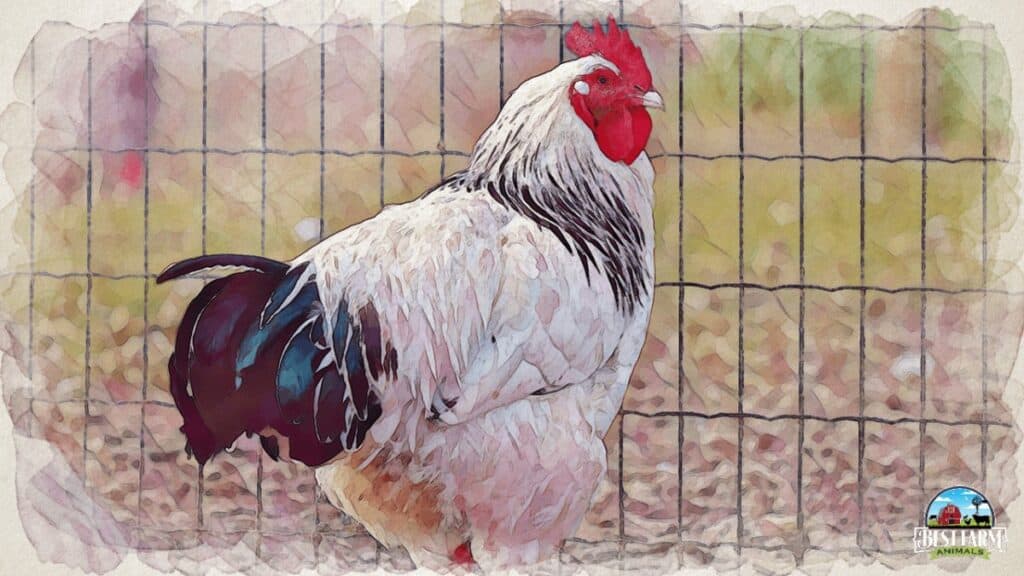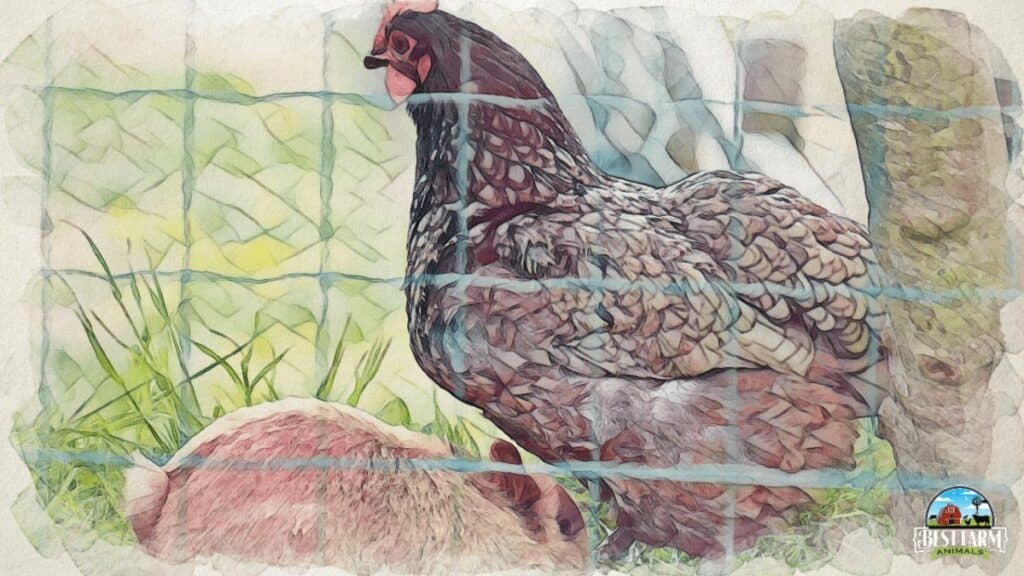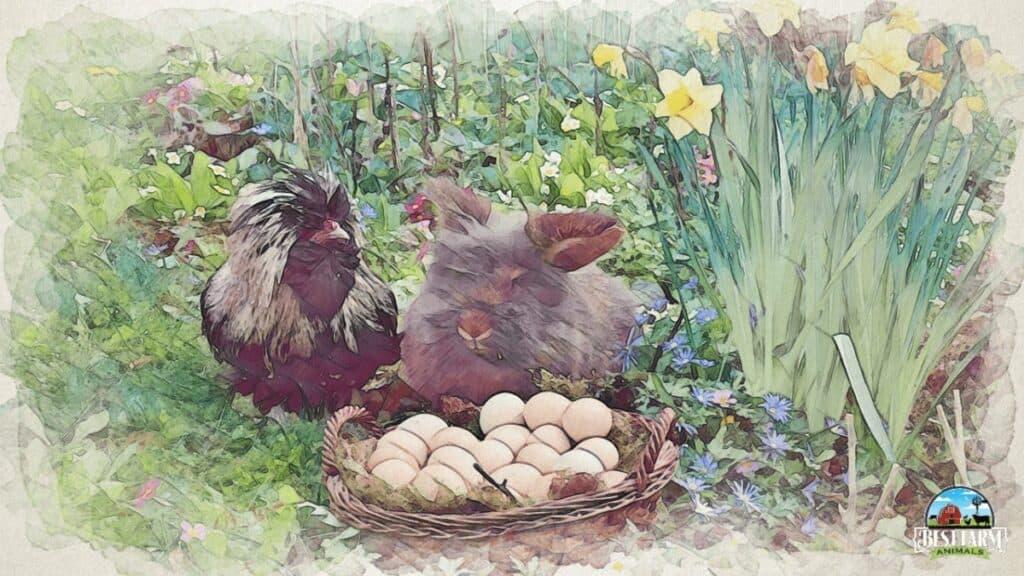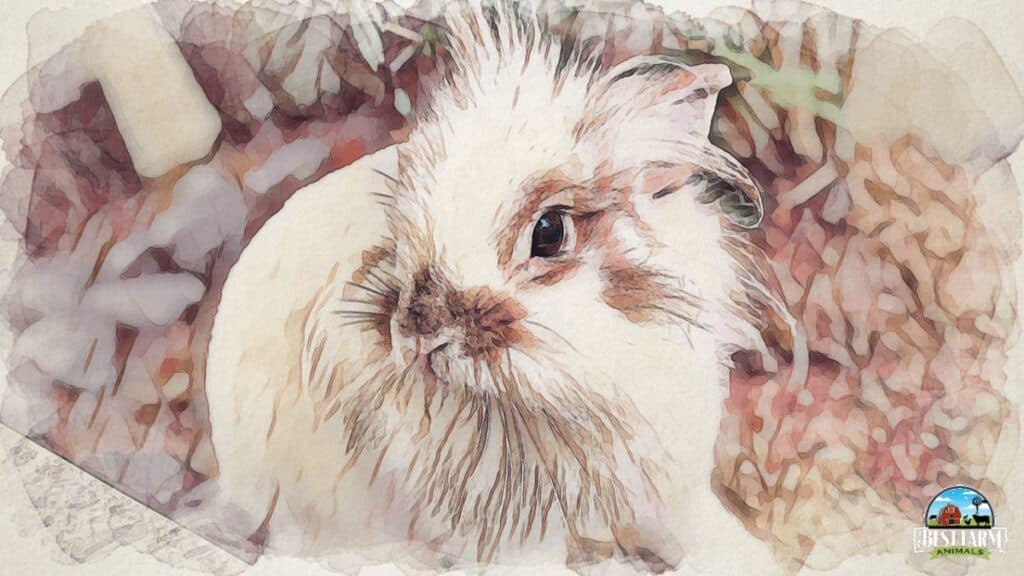Keeping rabbits and chickens together sounds like the perfect match. After all, both are highly sociable, and a chicken run is ideal for a bunny to hop around. But, can you really pair them together in one enclosure?
Can rabbits and chickens live together? Rabbits and chickens live together is possible as long as they’re introduced while young and have their individual hutches and coops to sleep in. Both animals are social creatures so they’re likely to form a bond. Also, rabbits are considered pseudo-ruminant herbivores which pair easily with a poultry animal like chicken.
However, you must be mindful that keeping rabbits and chickens together may create health issues through the transmission of diseases.
Rabbits and chickens living together is certainly space efficient, not to mention cost-efficient. But, farm owners need to make an effort for the union to succeed. Here we highlight steps you need to take when raising these two animals together.
Can Rabbits And Chickens Live Together?
It’s possible for rabbits and chickens live together, but they should have separate areas to eat or sleep. These animals can get along easily and may eventually become best friends. However, you must understand the differences between the two species as well as their similarities if they’re to live in harmony.
Introduce Rabbits And Chickens When Young
Before chickens and rabbits live together, they first need time to get to know each other. It’s better if they’re still a chick and a bunny so they won’t fight and learn to get use with each other. Rabbits and chickens are prey animals, so it’s normal for them to be fearful and skittish.
In some cases, older rabbits and chickens can still learn to live together as long as you introduce them slowly.
Can you put baby rabbits in with chickens? No, you can’t put baby rabbits in with chickens. This is one of the major exceptions in the rabbits and chickens live together setup. Baby rabbits can’t live with old chickens because the chickens can hurt and peck the bunny, which may result in the baby rabbit’s severe injuries or even death.

Rabbit and Chicken Coop Layout Should Be Spacious
The rabbit and chicken coop for your rabbits and chickens must be spacious enough to move around and forage without getting in each other’s way. If chickens find the area too cramped, it could slow egg production amongst the flock because of stress, which could eventually lead to health problems and conflict between the two animals.
Remember, chickens and rabbits are different animals, so they need a large space where they can be alone to take a time out from each other.
Clean the Chicken and Rabbit Enclosure to Prevent Diseases
Just like in any animals, you must keep the rabbit and chicken living area regularly mucked out, as rabbits are much cleaner than chickens. It’s essential for chickens and rabbits to live in a clean and hygienic environment in order to remain healthy. A dirty or cluttered living area can cause bacteria and parasites to thrive, which could lead to serious infections and diseases.
Additionally, ammonia build-up in unclean environments can cause respiratory problems such as chronic bronchitis. Providing a quality, well-ventilated home free of dust and dander will ensure your chickens and rabbits stay happy and healthy!
Rabbits tend to become more stressed out in a dirty environment, not to mention the possible health issues that could arise. On the other hand, chickens don’t mind the dirty environment since they poop a lot and make huge mess everywhere. So, they’re really different on that.
Is rabbit poop safe for chickens? Rabbit poop is somehow safe for chickens, but not recommended for them to peck and eat. Rabbits are herbivores, so it’s okay for chickens to eat rabbit’s poop. Take note, any animal feces can be detrimental to the health of those around it, same with rabbit poop to chickens or vice versa.
Rabbits and Chickens Still Need Separate Spaces for Privacy
Although we’re pushing for the idea of chickens and rabbits live together, these animals still need their own space where they can hide and have some privacy. Although they can happily share a run, they all need separate coops and hutches where they can peacefully eat, sleep, and have time away from each other.
Additionally, rabbits also carry certain parasites that chickens are potentially sensitive to, and it is not advisable for the two animals to share living quarters. Keeping them separated will keep both species healthy and reduce their risk of disease or illness.

Tips on How to Let Rabbits and Chickens Live Together:
- Introduce rabbits and chickens while young before living together
- Ensure a spacious rabbit and chicken coop
- Regularly clean the rabbit and chicken enclosure
- Remove the unpleasant smells inside coop
- Create a well-ventilated chicken and rabbit coop
- Place separate areas for rabbits and chickens to sleep and eat
Rabbits And Chickens Live Together: Ideal Ratio in a Coop
If you’re planning to have rabbits and chickens live together, get at least two of each animals inside a coop. In this way, the rabbit neither the chicken will not be taken advantage by the dominant animal.
It’s also possible for a rabbit to stay inside a coop of two or more chickens, as long as it’s already comfortable with their presence and the rabbit lived with the chickens while young.
Can Rabbits Get Sick From Chickens?
Chickens normally carry diseases and bacteria that don’t affect them but could make your rabbits sick on the long run. The downside to keeping chickens and rabbits live together is the possibility of the two animals species transmitting diseases, with some affecting one more than the other.
Rabbits Can Get Coccidiosis From Chickens And Vice Versa
Rabbits can get coccidiosis from chickens, but chickens can also get the disease from rabbits. Coccidiosis is a common intestinal health problem when an animal ingests or has contact with another animal’s feces. The severe coccidiosis can be contagious, and kill a rabbit if left untreated.
Salmonella is a Threat in Rabbit and Chicken Coop
Salmonella affects many chickens and, if it passes to rabbits, can make them very sick, with a mortality rate above 90%. Salmonella can be a threat if you’re planning to have rabbits and chickens living together since rabbits can digest chicken feces in a coop. A rabbit with salmonella can get very sick, so cleaning the rabbit and chicken coop is a must.
Rabbits Can Acquire Mycoplasma From Chickens
Mycoplasma is a common disease in birds, like chickens, and can be acquired once rabbits and chickens live together. It’s easier for this disease to get to your pet rabbits once they live together with chickens. After all, mycoplasma is caused by contamination of water, feed, and environment, which can happen inside a rabbit and chicken coop.
Chicken Mites Can Transfer to Rabbits
Chicken mites can transfer to rabbits, especially if the rabbits and chickens live together in one area. Although mites aren’t going to last in a rabbit’s body, it can still be harmful for your pet. Regularly clean their enclosure to prevent such thing to happen.
Other possible diseases transmitted between chickens and rabbits include streptococcus and pasteurellosis. If these two species live together, the transmission of diseases will always be a concern.
If you notice a sick rabbit or chicken, you must remove them from the group and isolate them, as otherwise, one sick animal can affect the whole farm. Speak to your vet if you have any concerns on chickens and rabbits live together setup.

Can Rabbits And Chickens Eat The Same Food?
Rabbits and chickens can’t eat the same food even if the rabbits and chickens live together. Rabbit and chicken pellets look very similar, so you may think you can feed the two animals the same food. However, they have very different nutritional needs.
Chickens are omnivores and can eat almost anything.Their food contains nutrients like calcium and protein that rabbits cannot digest. It’s also high in carbohydrates, which can cause an imbalance in rabbit gut bacteria and lead to GI stasis in your bunny.
Meanwhile, rabbits are herbivores, and their pellets mostly contain alfalfa or timothy hay, which means although they’re safe for chickens to eat, they won’t provide all the nutrients they need to stay healthy. However, feeding rabbit pellets as an occasional treat to your chickens is fine.
Do Chickens Peck at Rabbits?
Initially, your chickens might attack the rabbits and try to peck them. Often, they’re not too keen on fast-moving animals. They also do this to establish their pecking order and establish a dominant hierarchy, which is a perfectly normal behavior in chickens and rabbits live together setup.
Although they won’t attempt to eat a grown rabbit, a chicken may look at baby rabbits as food. Best to keep their housing separate, especially when newborn bunnies are present. One last point to be aware of is your chickens’ eggs.
Do rabbits take chicken eggs? Rabbits don’t eat or take chicken eggs, but they’re naturally curious animals and may accidentally damage an egg while exploring. Once that happens, chickens can bevery defensive regarding their eggs and may turn aggressive towards the rabbits, so you must be careful.
You should first keep rabbits in a sectioned-off area of the run so they can get to know one another safely. But, as we know, chickens are omnivores and their diet may include worms, lizards, frogs, baby birds, and other small animals.
Will Rabbits Attack Chickens?
In rabbits and chickens live together setup, rabbits can be okay with chickens but it’s not unheard of for rabbits to attack chickens, going for their fragile necks and causing injury and even death. However, it still depends on the rabbit’s breed, size and personality. What’s more, an unneutered male rabbit will mount anything in sight, including chickens.
Rabbits might seem cute, gentle animals, but both male and female rabbits can be territorial and aggressive.They also have strong hind legs and can give hard kicks.
All rabbits must be spayed or neutered to eliminate territorial and aggressive behaviors, prevent unwanted litters and protect them from certain cancers and illnesses. It will also help the rabbits to live peacefully with your chickens.
Rabbits And Chickens Live Together FAQs
The setup of rabbits and chickens live together in peace is possible. However, as an owner, make sure you understand the differences between the two animals. Get each of them enough space to be alone and be with their own species. Also, don’t try to give them food of each other, and always monitor their behavior.
Can Chickens Sleep In A Rabbit Hutch?
Chickens can sleep in a rabbit hutch, but they still need a space for them to get a privacy and be with their own kind. Chickens are social animals and can function well if comfortable with their surroundings. Inside a coop, chickens do communal activities that they do as a group, so don’t be overconfident in letting a rabbit and chicken live together at all times.
Can A Chicken And A Rabbit Breed?
There’s no study proving that a chicken and a rabbit can breed, but morally, it’s not accepted. Male rabbits, however, do hump chickens, especially if they aren’t neutered yet. In the end, the chicken may get hurt through the rabbit humping because bunnies have sharp teeth and claws. Thus, you shouldn’t breed these animals in chickens and rabbits live together setup.
Can Lionhead Rabbits Live With Chickens?
Lionhead rabbits can live with chickens, like any other rabbit breeds. However, it’s good to note that lionhead rabbits are smaller than a normal rabbit breed, which makes them more at risk to get hurt in a chicken coop. They’re also prone to diseases that chickens may transfer to rabbits.
Conclusion
Rabbits and chickens live together is a popular idea for animal owners because both animals are common home pets. Whether to solve space issues or other reasons, it’s okay for chickens and rabbits to live together and stay in one place, but not all the time.
Make sure to give them enough space to play and socialize with each other. At the same time, give the rabbits and chickens individual homes to be with their own kind.
My Favorite Chicken and Duck Supplies
This list contains affiliate products. Affiliate products do not cost more but helps to support BestFarmAnimals and our goal to provide farm animal owners with accurate and helpful information.
Manna Pro Oyster Shell keeps eggs strong. Before I gave my chickens oyster shell, I had the oddest eggs, many with weak and irregular shells. Now, I don’t have an issue.
Layer Feed by Manna Pro. I like pellets rather than crumbles as my chickens eat them better and less gets wasted or scavenged by rodents. A good layer feed makes the difference in hens laying many more eggs.
My chickens love this mealworm treat, which gives added protein, something that’s great during molting and winter months.
There are many ways to feed and water your chickens. I like this food and water setup the best because it reduces waste, saves me time feeding and watering, and keeps the food fresh longer. Except, in the winter, I use a heated waterer. The only problem is the heated waterers need to be replaced every few years.
I love this chicken veggie hanger. It makes it easy to give your chickens produce from the garden and keep them occupied in the winter with a fresh head of lettuce.
These chicken toys are a hoot! They will help curb bullying and keep your chickens active, especially in the winter when hens tend to get more lethargic.
Recommended Rabbit Supplies
This list contains affiliate products. Affiliate products do not cost more but helps to support BestFarmAnimals and our goal to provide farm animal owners with accurate and helpful information.
Housing: If your rabbit is indoor, you’ll need a cage, a hideout (to keep your rabbit from death by heart attack), and a space for it to get exercise and spend time with you. If you don’t want to let it run free in your house, this animal playpen provides space and keeps your rabbit from hiding under your couch.
If you keep your rabbit outdoors, an outdoor hutch that provides space and protection from predators is needed. (I’d still keep mine in a barn for further protection from the elements.)
You’ll also need bedding, toys, a grooming brush, and treats for your little friend. A litter box is important because rabbits can be potty trained. Timothy hay is the best kind of hay for rabbits as alfalfa is too sweet. Don’t forget a water drinker. I like the half-gallon waterer because it can cover two rabbits for several days. Pair it with a food bowl or a food manger (a little cleaner) and you’ll be set up!
If you want to treat your bunny to entertainment, a cat tower, a treat ball, or bunny toys all work wonderfully.
Finally, if you plan on taking your rabbit with you on trips, you’ll need a carrier. Here’s a small carrier or larger carrier that work great for occasional travel. If you travel a lot, you might want the carrier that’s rated #1 in safety for safe travels
Lastly, I use this odor eliminator for accidents and to wipe out the bottom of the cage and litter box when I clean it.
Resources:
Sage Publication:
https://journals.sagepub.com/doi/abs/10.3181/00379727-100-24588?journalCode=ebma
Science Direct:
https://www.sciencedirect.com/science/article/pii/S0362028X22054461
IEEE Xplore

